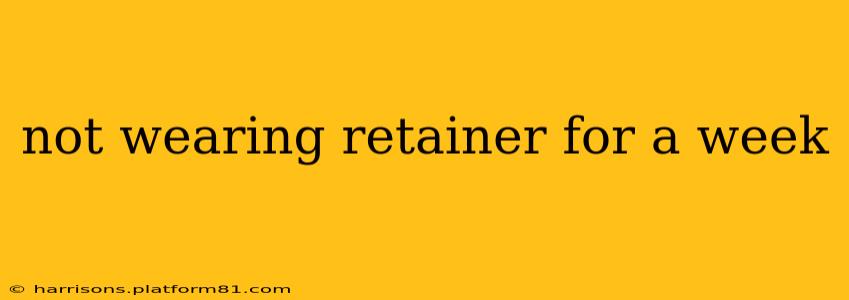Forgetting your retainer for a week might seem like a minor inconvenience, but the reality is that even short periods without this crucial orthodontic appliance can have significant consequences for your teeth and smile. This article explores the potential impacts of neglecting your retainer and answers frequently asked questions surrounding retainer usage.
What Happens if I Don't Wear My Retainer for a Week?
The impact of skipping your retainer for a week depends on several factors, including your age, the type of retainer you have (removable or fixed), and the duration of your orthodontic treatment. However, some common consequences include:
-
Slight Shifting: Your teeth are most susceptible to shifting immediately after braces are removed. A week without a retainer could cause minor movement, potentially leading to crowding or misalignment. This is especially true for younger individuals whose jaws are still developing.
-
Increased Relapse Risk: The longer you go without wearing your retainer, the greater the risk of relapse. This means your teeth gradually return to their original position before orthodontic treatment. A week might not cause a dramatic shift, but it contributes to the overall relapse likelihood.
-
Discomfort: As your teeth shift, you may experience discomfort, tightness, and even pain. This is a sign that your teeth are moving out of their ideal alignment.
-
Increased Treatment Time (if relapse occurs): If your teeth shift significantly due to prolonged retainer neglect, you may need to undergo further orthodontic treatment to correct the misalignment, leading to additional time and expense.
How Much Will My Teeth Shift in a Week Without a Retainer?
The amount of shifting varies greatly from person to person. Some individuals might experience minimal change, while others may notice a more significant shift. Factors influencing this include the severity of your original misalignment, the type of retainer, and the inherent stability of your teeth. While a week might not result in a dramatic change visible to the naked eye, even subtle movement can set the stage for more significant relapse later.
Is It Okay to Not Wear My Retainer for a Few Days?
While occasional short breaks are less problematic than a week-long absence, it's generally recommended to wear your retainer as directed by your orthodontist. Even a few days without your retainer can allow your teeth to begin shifting slightly, increasing the risk of relapse in the long run. Consistency is key to maintaining the results of your orthodontic treatment.
What Should I Do if I've Gone a Week Without My Retainer?
If you've gone a week without your retainer, don't panic. The best course of action is to contact your orthodontist immediately. They can assess the situation, determine the extent of any shifting, and advise on the best way to proceed. They might recommend wearing your retainer more consistently going forward or might suggest a brief adjustment period.
Can I Fix My Teeth Myself After Not Wearing My Retainer?
No, you should absolutely not attempt to fix any shifting yourself. Improperly attempting to realign your teeth can cause further damage and could lead to more serious complications. Only your orthodontist possesses the expertise and tools to safely and effectively address any relapse.
What are the Long-Term Effects of Not Wearing a Retainer?
Long-term neglect of your retainer can lead to a complete relapse, reversing the results of your orthodontic treatment. This can result in an uneven bite, crooked teeth, jaw pain, and difficulties with chewing and speaking. It's crucial to wear your retainer as prescribed to maintain the health and aesthetics of your smile.
In Conclusion: While a single week without a retainer might not cause catastrophic damage, it increases the risk of relapse and potential discomfort. Consistent retainer use is vital to preserving the results of your orthodontic treatment and ensuring a healthy, beautiful smile for years to come. Always consult your orthodontist with any questions or concerns regarding your retainer.
